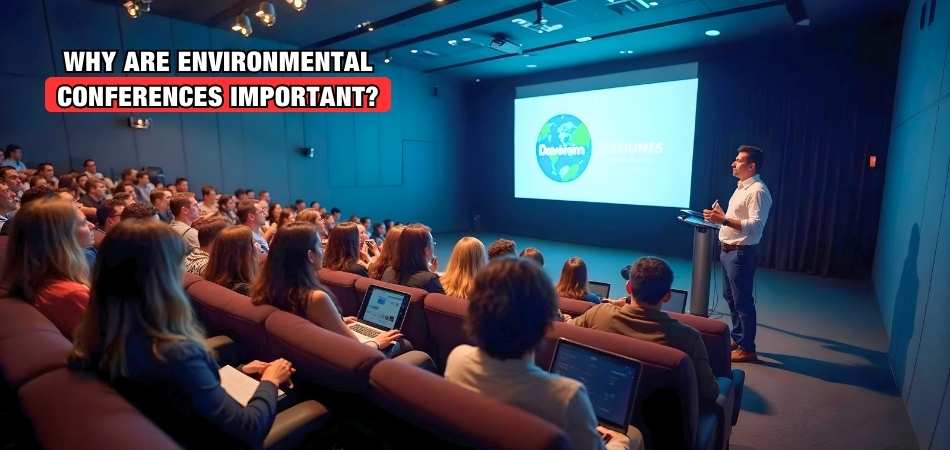In a world grappling with climate change, deforestation, and biodiversity loss, finding solutions to environmental challenges has never been more urgent. Bringing together scientists, policymakers, activists, and industry leaders, environmental conferences play an important role in encouraging collaboration and driving meaningful change. But why are environmental conferences important?
Environmental conferences contribute significantly to raising awareness, creating collaboration, and developing sustainable policies. They bring together diverse perspectives to create actionable strategies for combating global environmental issues. These events inspire innovation, drive change, and ensure collective action toward a healthier planet.
Are you curious to learn more about this topic? Take a look at this article to discover all the essential information about why these conferences are vital for addressing environmental challenges.
What Are Environmental Conferences Exactly?
Environmental conferences are global events where experts, policymakers, activists, and stakeholders discuss pressing ecological issues. These events serve as platforms for collaboration, aiming to address challenges such as climate change, biodiversity loss, and sustainable development. By encouraging dialogue, they help develop policies and promote actionable solutions to protect the planet.
These conferences often feature keynote speeches, workshops, and panel discussions. Attendees share knowledge, showcase innovations, and explore strategies for balancing economic growth with environmental preservation. They also provide networking opportunities, enabling participants to build partnerships and exchange ideas for a greener future.
Different countries host these events, reflecting the global nature of environmental challenges. For instance, Canada has been a prominent host, offering a platform for discussions on conservation and climate action. Attending the upcoming environmental conference in Canada is a great way to continue this tradition by bringing together diverse voices for global change.
Why Are Environmental Conferences Important?
Environmental conferences play a crucial role in developing policies, advancing innovation, and promoting sustainable practices across the globe. By bringing together experts, activists, and policymakers, these conferences contribute significantly to global efforts to protect the planet. Let’s take a look at why environmental conferences are so important.
Raising Awareness About Environmental Issues
Environmental conferences help raise awareness about crucial environmental challenges like climate change, deforestation, and pollution. Attendees have the opportunity to gain in-depth knowledge about the issues affecting the planet, which they can share with their communities.
These events provide a space where experts and thought leaders discuss research findings, trends, and new solutions to mitigate environmental damage. This knowledge-sharing helps spark action on a broader scale, influencing individuals and organizations to make positive changes.
Facilitating Collaboration Across Sectors
One of the key reasons environmental conferences are important is their ability to bring together people from different sectors to work toward a common goal. Whether it’s government officials, business leaders, scientists, or NGOs, these events support collaboration between stakeholders who may not typically engage with each other.
By sharing diverse perspectives and expertise, participants are better equipped to address complex environmental issues that require collective effort. The collaboration that takes place at these conferences often leads to the development of more effective, innovative solutions to environmental problems.
Shaping Environmental Policies and Legislation
Environmental conferences are vital for influencing policy development and legislation. During these events, attendees often discuss and evaluate current environmental laws, propose new policies, and advocate for legislative changes that can have a lasting impact. As key decision-makers from around the world come together, they can align on best practices and create a unified approach to environmental protection.
Such conferences also serve as a platform for promoting collaboration among nations, organizations, and communities. By sharing research, technological advancements, and innovative solutions, attendees can address pressing environmental challenges more effectively.
Showcasing Green Innovation and Technology
Another crucial aspect of environmental conferences is their role in showcasing innovations in green technology and sustainable practices. From renewable energy solutions to eco-friendly manufacturing processes, these events provide a platform for companies and startups to present their latest technological advancements.
Attendees can learn about sustainable solutions that contribute to a more sustainable future. The exchange of ideas and the visibility these innovations receive can help accelerate the adoption of green technologies, making them more accessible to industries and governments worldwide.
Networking and Professional Development Opportunities
Environmental conferences also offer valuable networking opportunities for professionals looking to expand their careers or find like-minded collaborators. Whether it’s meeting industry leaders, researchers, or fellow advocates, these conferences allow individuals to develop meaningful connections that can lead to new partnerships, job opportunities, or collaborative projects.
The benefits of attending an environmental conference go beyond gaining knowledge; they also provide participants with the chance to exchange ideas and strategies that can help them grow professionally while contributing to the greater cause of environmental protection.
Advancing Global Environmental Goals
At the core of every environmental conference is the collective goal of addressing global environmental challenges. By uniting individuals from around the world, these events create a sense of urgency and shared responsibility for the health of the planet. The conversations that take place at these conferences are essential for driving forward initiatives and climate action agreements.
Environmental conferences are crucial in addressing the many challenges our planet faces. They raise awareness, help collaboration, shape policies, showcase innovation, and provide professional development opportunities. Attending an environmental conference offers participants not only knowledge and insight but also the opportunity to actively contribute to global sustainability.
Key Topics Discussed at Environmental Conferences
Environmental conferences serve as a platform to address pressing issues affecting our planet. Experts, activists, and stakeholders gather to discuss solutions and share insights on various environmental topics. These discussions help shape the future of sustainable practices and global environmental policy. Below are some key topics that are commonly explored at these events.
Climate Change and Global Warming
One of the most urgent topics discussed is climate change and its impacts on the planet. Sessions often focus on the latest scientific findings, mitigation strategies, and adaptation techniques to address rising temperatures and extreme weather events. Participants explore innovative solutions to reduce greenhouse gas emissions and transition to low-carbon economies, emphasizing the global need for immediate action.
Biodiversity and Conservation
Biodiversity loss and conservation strategies are central themes at many environmental conferences, where attendees learn about the importance of protecting ecosystems, wildlife habitats, and endangered species. These discussions provide opportunities to learn from environmental conferences about sustainable practices that can prevent habitat destruction and promote the restoration of ecological balance. Participants often leave equipped with knowledge and tools to implement effective conservation initiatives in their communities or organizations.
Renewable Energy and Sustainability
Another key focus is on renewable energy technologies and their role in building a sustainable future. From solar and wind power to advancements in energy storage, these sessions showcase innovative ways to reduce reliance on fossil fuels. Discussions also include strategies for energy efficiency and integrating renewable energy systems into urban and rural infrastructure.
Pollution Control and Waste Management
Pollution control, including air, water, and soil contamination, is a recurring topic. Attendees discuss innovative technologies and policy frameworks to reduce pollution and manage waste sustainably. Circular economy models and recycling innovations are often highlighted as solutions to minimize the environmental impact of human activities.
Environmental Justice and Equity
Environmental conferences increasingly address issues of equity, ensuring that vulnerable and marginalized communities are not disproportionately affected by environmental challenges. Discussions focus on achieving fairness in resource distribution, combating environmental racism, and empowering communities to participate in decision-making processes.
Environmental conferences are a vital forum for addressing these and other pressing issues. They provide an opportunity for stakeholders to collaborate, share ideas, and develop actionable solutions. Whether it’s through exploring renewable energy or learning how to advance conservation efforts, these events encourage the exchange of knowledge essential for driving meaningful change.
How Do Environmental Conferences Influence Sustainable Practices?
Conferences on environmental issues are powerful tools for advancing sustainable practices. These events bring together experts, innovators, and policymakers to address environmental issues collaboratively. Here are some key ways these conferences drive the adoption of sustainable practices.
Promoting Knowledge Sharing and Education
Environmental conferences provide a platform for sharing the latest research, strategies, and case studies in sustainability. Experts present data on topics such as renewable energy, resource conservation, and waste reduction. This exchange of knowledge equips attendees with actionable insights that they can implement in their industries, communities, or personal lives. By nurturing education, these events empower individuals and organizations to adopt more sustainable approaches.
Encouraging Innovation in Sustainable Technologies
These conferences often serve as a launchpad for showcasing new technologies and innovations that promote sustainability. From green building materials to advancements in renewable energy, attendees are introduced to innovative solutions. This exposure helps industries and governments adopt technologies that reduce environmental impact and improve efficiency. The focus on innovation drives progress in sustainable practices across various sectors.
Promoting Policy Development and Advocacy
Environmental conferences play a significant role in shaping policies that support sustainability. Policymakers and advocates come together to discuss regulatory frameworks, incentives, and strategies for encouraging environmentally responsible behavior. These discussions often result in actionable recommendations that influence national and international policies. By connecting decision-makers, conferences ensure that sustainability remains a priority on the policy agenda.
Building Collaborative Networks
Collaboration is key to implementing sustainable practices effectively, and conferences provide an ideal environment for networking. Attendees from diverse backgrounds—academy, industry, and government—form partnerships to work on sustainability-focused projects. These networks encourage the sharing of resources, ideas, and best practices, amplifying the impact of sustainable initiatives globally.
Inspiring Action Through Success Stories
Real-world examples and success stories shared at environmental conferences inspire attendees to take action. Hearing about successful sustainability projects motivates individuals and organizations to replicate similar efforts. These stories demonstrate the tangible benefits of adopting sustainable practices, making the concept more relatable and actionable.
How to Choose the Best Environmental Conference for You?
Choosing the right environmental conference can maximize your learning, networking, and overall experience. With so many options available, focus on what aligns with your goals and interests. Here are key factors to consider when selecting the best conference for you.
Identify Your Objectives
Before choosing a conference, clearly define what you hope to achieve by attending. Whether it’s networking with industry leaders, learning about specific topics, or exploring innovative technologies, having clear goals will help you select an event that meets your needs. Knowing your objectives ensures your time and investment bring valuable outcomes.
Evaluate the Conference Agenda
Review the agenda to ensure the topics, workshops, and sessions are relevant to your field of interest. Look for keynote speakers, panel discussions, and breakout sessions that align with your professional or academic goals. A well-structured agenda with diverse topics is a sign of a high-quality conference that can provide valuable insights.
Consider the Location and Format
Decide if you prefer an in-person or virtual conference based on your schedule, budget, and travel preferences. In-person events may offer richer networking opportunities, while virtual conferences provide flexibility and cost savings. Additionally, consider the conference location if attending in person, as accessibility and venue amenities can impact your overall experience.
Research the Reputation of the Organizers
Choose conferences organized by reputable institutions, universities, or organizations known for their expertise in environmental topics. Established organizers are more likely to attract credible speakers and a diverse audience, ensuring the quality of the event. Researching past editions of the conference can also provide insights into its effectiveness and value.
Assess Networking Opportunities
Networking is often a key reason for attending conferences, so evaluate how the event facilitates connections. Look for events that include social gatherings, interactive workshops, or networking sessions. These opportunities allow you to connect with professionals, researchers, and advocates who share your interests and can improve your career or projects.
Check Reviews and Testimonials
If possible, read reviews or testimonials from past attendees to gauge their experience. These insights can help you understand the strengths and weaknesses of the conference, such as the quality of speakers, content, and organization. Feedback from previous participants provides a realistic perspective on what to expect.
FAQs
Environmental conferences are transformative events that drive change, inspire collaboration, and address pressing ecological challenges. Below are some frequently asked questions to further explain their significance.
How Do Environmental Conferences Impact Local Communities?
Environmental conferences positively influence local communities by spotlighting regional ecological challenges and solutions. They provide a platform for community voices, encouraging localized discussions and ensuring participation in global conversations. This engagement often inspires actionable steps to tackle environmental issues at the grassroots level.
What Role Do Environmental Conferences Play in Educating Youth?
These conferences serve as a hub for youth education by offering dedicated sessions, workshops, and activities designed for young people. By engaging students and early-career professionals, they inspire activism and equip them with the knowledge and skills necessary to tackle future environmental challenges.
Can Environmental Conferences Influence Business Practices?
Environmental conferences significantly impact businesses by exposing them to sustainable innovations, eco-friendly technologies, and green policies. These insights enable companies to adopt practices that reduce their environmental footprint, improve sustainability efforts, and align with global ecological goals, boosting corporate social responsibility.
How Do Environmental Conferences Promote Global Unity?
By bringing together nations, organizations, and individuals, environmental conferences support global unity in addressing shared ecological concerns. They facilitate dialogue, encourage cross-border collaboration, and promote a collective commitment to implementing solutions for pressing environmental challenges.
What Are the Economic Benefits of Hosting Environmental Conferences?
Hosting environmental conferences offers substantial economic benefits, including increased tourism, job creation, and global visibility. These events also reinforce a host nation’s reputation for environmental leadership, often attracting investments in sustainable technologies and eco-friendly initiatives.
Final Thought
Environmental conferences are crucial in addressing global ecological challenges. They raise awareness, help collaboration, and build policies that promote sustainability and innovation. By uniting stakeholders worldwide, these events promote meaningful action, highlighting exactly why are environmental conferences important for protecting our planet’s future.
To make the most of these conferences, stay informed about upcoming events, actively participate in discussions, and network with like-minded individuals. Every step you take can contribute to meaningful environmental change. Best wishes as you explore, learn, and take action for a greener future!








